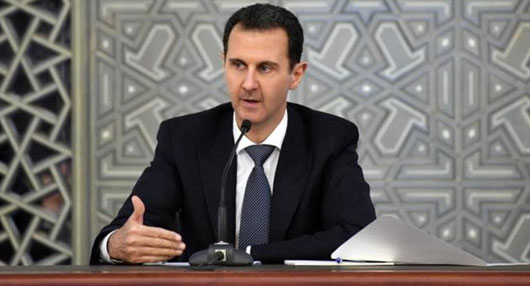by WorldTribune Staff, February 2, 2018
Syria has “evolved” its chemical weapons arsenal and is developing new ways to use the weapons, U.S. officials say.
Reports from Arab news outlets on Feb. 5 said a chemical weapons attack, believed to be chlorine gas, killed 20 people in a town in Idlib province.
The forces of Syrian President Bashar Assad are using smaller amounts in chemical attacks and attempting to make it more difficult to trace the chemicals’ origins, the U.S. officials told reporters in a briefing last week.

The officials warned the Assad regime would launch more smaller chemical attacks as an “instrument of terror” to compensate for Syria’s lack of adequate manpower to retake some opposition-held areas, Reuters reported on Feb. 1.
“They think they can get away with it if they keep it under a certain level,” one official said.
A suspected chemical weapons attack on the rebel-held town of Saraqeb was carried out late on Feb. 4, Arab media reported.
Women and children were among those killed in what was reported as a chlorine gas attack on the town near the Turkish border, the reports said.
U.S. Defense Secretary Jim Mattis had warned Syria just days before against using chemical weapons.
“You have all seen how we reacted to that, so they’d be ill advised to go back to violating the chemical convention,” said Mattis, referring to the April 2017 U.S. missile strike on a Syrian airbase following a chemical attack blamed on the Syrian regime.
Syria is suspected of using chlorine gas in another recent attack on a rebel-held enclave east of Damascus that sickened at least 13 people.
U.S. State Department spokeswoman Heather Nauert said on Feb. 1 the United States also was “extremely concerned” about reports that Syrian forces had carried out another chlorine gas attack last week, the latest one being carried out in the eastern Ghouta area.
The Syrian government has denied carrying out any of the chemical attacks.
Assad is believed to maintain a chemical weapons stockpile despite a U.S.-Russian deal requiring Damascus to hand over all such weapons for destruction in 2014, the officials said.
The officials believe Syria began testing the new methods after U.S. President Donald Trump in April 2017 ordered a missile strike on Shayrat air base, from which Syria is said to have launched a deadly sarin attack on a rebel-held area.
“We reserve the right to use military force to prevent or deter the use of chemical weapons,” one official said.
A second official said the Trump administration hopes stronger international sanctions and increased diplomatic pressure will help rein in Assad’s chemical weapons program.
If the international community does not act quickly, Syria’s chemical weapons could spread beyond its borders and possibly even “to U.S. shores,” the second official said.
“It will spread if we don’t do something,” the official warned.
Subscribe to Geostrategy-Direct __________ Support Free Press Foundation
